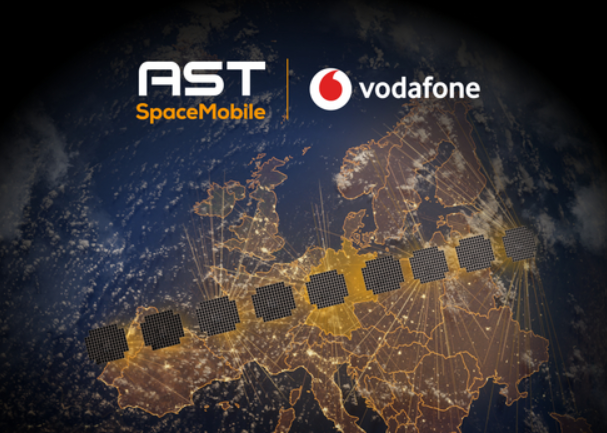AST, Vodafone make European satellite commitment
November 10, 2025
By Chris Forrester

Satellite operator AST SpaceMobile and giant telco Vodafone are creating a new European satellite constellation that will be headquartered at the Satellite Operations Centre in Germany. The project will deliver direct-to-device (D2D) connectivity and be an alternate to the progress Starlink is making with its D2D scheme.
The pair’s ‘SatCo’ says it aims to provide a scalable European satellite mobile broadband service for use by MNOs to benefit all European citizens, businesses and public sector organisations. MNOs in 21 European Union (EU) member states and other European countries have expressed interest in adopting the service, with commercial launch planned to commence from 2026. AST SpaceMobile filed with the International Telecommunications Union (ITU) through Germany for registration of this new mid-band satellite constellation.
The planned EU constellation will include a comprehensive ‘command switch’ feature to support European oversight and security. This capability supports updating all telemetry, tracking, and control (TTC) encryption keys for both S-Band (used to connect smartphones from space) and Q/V-Band (used for links between satellites and earth stations). It also allows for the modification of service encryption keys for communications across the continent, as well as manages the activation, deactivation, and direction of satellite beams in Europe.
Some observers suggest this proposal is a direct threat to the €10 billion+ European Commission’s IRIS2 mega-constellation being managed and planned by the SpaceRISE consortium of SES, Eutelsat and Hispasat. Analysts at investment specialists Cantor Fitzgerald immediately raised its share price target for AST from $30 to $80 saying: “We think AST may have just won IRIS2”.
However, the AST+Vodafone project is very different to IRIS2. AST’s target is D2D and broadband for consumers. IRIS2 has as its target government and military and is a “highly secure” multi-orbit system with LEO (from Eutelsat, MEO (from SES) and high-level geostationary satellites from SES, Eutelsat and Hispasat. There could be benefits for the general population but those aims are far from certain and would focus on remote areas.
IRIS2 is planned to have 290 satellites in its configuration with SpaceRISE. One source explained the difference between IRIS2 and the (many) other D2D businesses, saying: “Direct-to-device companies like AST, Lynk and several others are being designed to provide “space cellular broadband” connectivity for consumers to text, place phone calls and eventually stream content. These D2D companies are partnering with large telecommunications who want to provide uninterrupted cellular connectivity even in remote places where there is no terrestrial coverage. D2D is also meant to connect to the mobile phone you have today. There is no need for specialised hardware with D2D. Government applications often require specialized hardware, antennas, etc.
AST has apparently added 96 new satellites to its overall scheme which now totals 344 satellites. It needs 45-60 in orbit to start a limited D2D service during 2026.
The SatCo HQ location, near Munich or Hannover, will be confirmed following final discussions with local authorities and partners.
AST and Vodafone say the new service would operate in the national spectrum bands of EU-based MNOs, but also be a candidate for access to the EU 2 GHz mobile satellite services (MSS) band. The European Commission will determine the licenses for this band when Viasat and EchoStar’s current authorisations expire in May 2027.
Vodafone Group CEO, Margherita Della Valle, commented: “SatCo delivers a sovereign satellite solution to the whole of Europe. It will give European operators access to secure and resilient satellite communications, complementing existing terrestrial telecommunications networks. By establishing a satellite constellation in the EU and our principal command centre in Germany, we are ensuring the next frontier of communications infrastructure is firmly embedded in Europe.”
“Together with Vodafone, we are accelerating the arrival of true mobile broadband from space across Europe,” said Abel Avellan, Founder, Chairman and CEO of AST SpaceMobile. “Germany’s Operations Centre will be the operations hub for our BlueBird constellation in Europe, enabling us to serve millions of users. Alongside our gateways, we are building a robust, secure infrastructure that ensures Europe stays connected with seamless mobile broadband, always.”
Cantor Fitzgerald’s commented: “What is IRIS²? Why does today matter? – IRIS² is a multi-orbital satellite constellation of 290 satellites for EU security, safety, and resilience, providing enhanced connectivity services. We think prevailing market wisdom has been that EU federal governments would come together and help their suppliers scale (either using OneWeb platform or a domestic source). However, we think that the dreams of EU achieving Space manufacturing independence are rapidly meeting the challenges of standing-up efforts after 20+ years of under-investment (digital payload technologies, solar supply chain, 3D print, headcount sourcing).”
Fitzgerald added: “We think [the] announcement reflects a solution to that problem, with AST being anointed as the best-positioned to fix these woes. At face value, initial AST satellites may screen as a “patch” vs. desires to scale sovereign suppliers, but we expect that AST (along with Tech partnerships) becomes a much more enduring supplier that serves as the desired counterweight to SpaceX’s Starlink (privately owned).”
No doubt more will be revealed during AST’s quarterly financial report later today [November 10th].
Other posts by :
- SpaceX gets a portion of India
- TerreStar wants to build LEO network
- Musk: “No Starlink phone”
- Russia accused of eavesdropping on satellites
- FCC welcomes Musk’s 1m satellite plan
- Telesat has problems with an LEO
- Orbital debris a real danger
- India boosts space budget
- Blue Origin drops passenger flights
